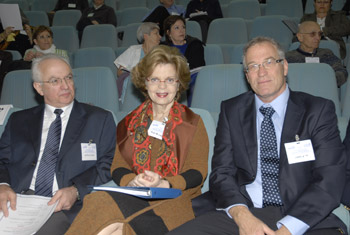Male fetuses are more trouble

Pictured from R to L: Dr Eyran Halpern, CEO, RMC, Prof. M. Legato, Editor-in Chief of Gender Medicine, Columbia University, New York, Prof. Marek Glezerman, Head, Helen Schneider Hospital for Women, RMC
Judy Siegel-Itzkovich, THE JERUSALEM POST
It isn't an "old wives' tale" that carrying a male fetus is more "troublesome" than carrying a female fetus, according to research encompassing over 66,000 women who gave birth at the Rabin Medical Center (RMC) in Petah Tikva between 1995 and 2006.
Prof. Marek Glezerman, Dr. Yariv Yogev and Dr. Nir Melamed of the medical center's Helen Schneider Hospital for Women and Tel Aviv University's Sackler Faculty of Medicine found in the retrospective study that a fetus being a male "is an independent risk factor" for preterm delivery, preterm rupture of membranes, delivery by vacuum and forceps or cesarean section; at the same time, female fetuses are at increased risk for breech presentation (legs first) and intrauterine growth restriction.
The study will be presented at the founding conference of the Israel Society for Gender Medicine, which will be held at Rabin Medical Center at the end of this month. Over 34,000 (51.8 percent) delivered boys and 32,000 (48.2%) delivered girls. The demographic and obstetric characteristics of the women with a male fetus and those with a female fetus were similar.
The rate of pre-term delivery (as early as 29 weeks) was higher for male fetuses and was attributed to an increased incidence of spontaneous preterm labor and preterm, premature rupture of membranes. Women carrying male fetuses were at increased risk for operative vaginal delivery, gestational diabetes, abnormal fetal heart rate and failed vaginal delivery and cesarean delivery. Female fetuses were more likely to experience restricted fetal growth, while males were at increased risk for being too big.
The doctors admitted that they did not have a clear understanding of the mechanisms by which fetal gender interacts with pregnancy outcome. But they said the broad and long-term study could help in the future to understand the mechanisms involved in premature birth and factors that influence fetal growth in the uterus.
Glezerman, who heads the Helen Schneider Women's Hospital, said the study of early differences between the sexes shows that medicine should regard males and females as different in their characteristics. "Further investigation of the mechanisms responsible for this association may contribute to our understanding of the pathophysiology of pregnancy complications such as preterm delivery and fetal growth.
Related Articles
Medical School Graduates Rate Israel's Rabin Medical Center a Top Choice for Residency
The city that never stops – Tel Aviv – continues to be the strongest draw among medical school graduates who want to serve as interns in hospitals.
Study at Rabin Medical Center On Induced Labor Shows No Harm to Mothers & Babies
Tel Aviv University study has determined that natural, spontaneous deliveries and induced deliveries following the rupture of the amniotic sac in the mother share similar neonatal outcomes, contradicting common wisdom.
Sharing Knowledge: Rabin Medical Center Meets With Israel Defense Medical Corps
Over 130 physicians and medical personnel from the Israel Defense Forces Medical Corps participated in a one day seminar organized by the Department of Hematology.